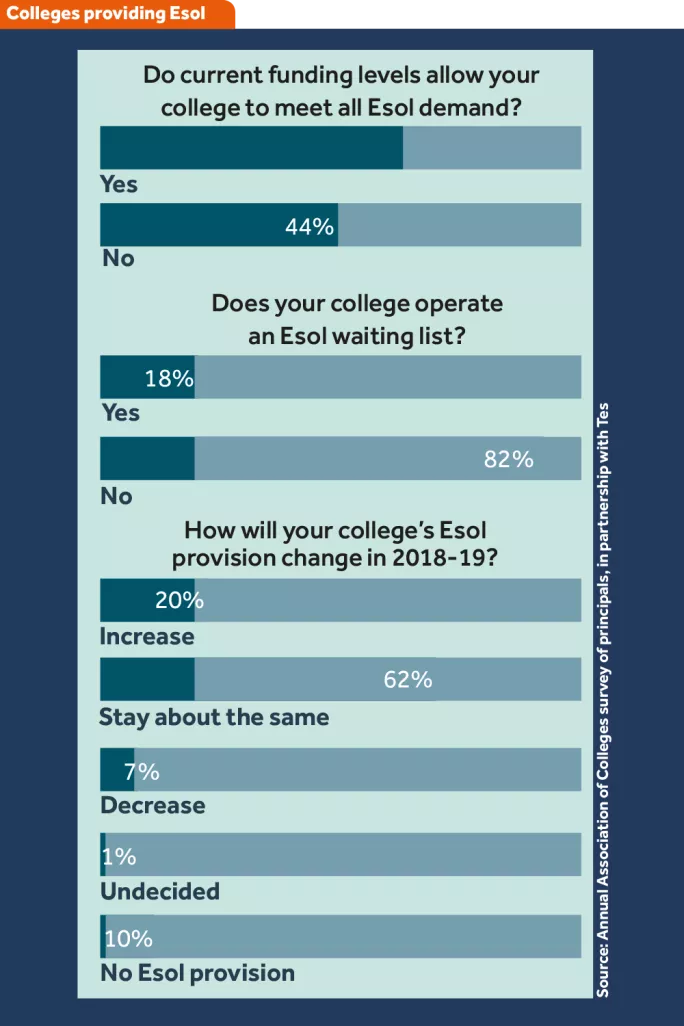‘We’ve got the momentum to put Esol back on the map’

After years of being overlooked and underfunded, English language provision for adult immigrants has reached a tipping point.
With funding available for English for speakers of other languages (Esol) having dropped by more than half (from £203 million in 2009-10 to just £90 million six years on), a survey by charity Refugee Action reported by Tes in October revealed a sector in crisis. Some 45 per cent of providers reported learners facing waiting lists of six months or more, rising in some cases to three years.
Jenny Roden, co-chair of the National Association for Teaching English and other Community Languages to Adults (Natecla), described the state of Esol provision as “the worst we can remember”, citing a “crumbling” infrastructure and an exodus of “demoralised” teachers. But this nadir was actually a turning point for Esol. Politicians began to sit up and take notice. Labour leader Jeremy Corbyn told the Association of Colleges’ annual conference in November that Esol was in a “dangerous state of disrepair”; afterwards, he pledged that a future Labour government would increase spending in this area.
And support began to come from across the political divide. Commons Treasury Select Committee chair and former education secretary Nicky Morgan wrote: “Investing in English language courses will unlock people’s potential to work, volunteer, socialise with their neighbours and make a full and active contribution to our society.”

In March - 15 months after Dame Louise Casey’s government-commissioned report on social integration was published - a Green Paper on an integrated communities strategy was finally made public. Esol was central in its recommendations - not least with the proposal for a national Esol strategy. A consultation on the plans closed this month; no more details have been forthcoming.
The annual Association of Colleges survey of principals, in partnership with Tes, reveals the impact of this uncertainty: 44 per cent of colleges said current funding levels did not allow them to offer sufficient Esol places to meet demand. As a result, one in five (18 per cent) of the colleges surveyed had a waiting list for Esol places.
Catherine Sezen, policy manager at the AoC, says funding is “far and away the biggest issue” for Esol providers. “We’ve had so many cuts to the Esol funding,” she explains.
And the impact of Brexit on the number of prospective Esol students coming to colleges is not yet clear, she adds. “Will the market bottom out because those people won’t stay in the UK?”
Stephen Hale, chief executive of Refugee Action, says that the Green Paper was “a huge missed opportunity for English language learning” owing to the lack of extra funding. “As a result, the current proposals will not enable a single individual refugee to access a single additional hour of accredited, formal English language teaching.”
But others in the sector see grounds for optimism. The recent announcement of a one-year trial by the Education and Skills Funding Agency (ESFA) to fully fund courses for learners earning less than £15,736.50 a year - significantly higher than the current threshold of £3,960 - could allow colleges to offer free Esol to thousands more learners in the coming months.
This development will “help enormously”, according to Jennie Turner, group curriculum director for Esol at New City College in London. With around 3,000 students each year, the college is one of the biggest Esol providers in the country. It allocates in the region of £5 million a year for Esol.
“We welcome this and expect it to make a significant difference to helping people who are working to access Esol education,” Turner says.

This week, the college announced it will waive all Esol fees in 2018-19. CEO Gerry McDonald says that the scale of its provision has allowed it to “eliminate Esol course fees, irrespective of learners’ circumstances.”
And once the adult education budget has been devolved to London in 2019-20, mayor Sadiq Khan plans to raise the threshold again to £19,890 - a move welcomed by Nafisah Graham-Brown, head of life skills and community at London training provider ELATT. The provider enrolled 400 Esol learners in 2016-17, with around 70 per cent of these covered by government funding.
Esol is, at present, fully funded for 19-plus learners who are unemployed and in receipt of benefits. The ESFA currently pays half of the course costs for other eligible learners, with the provider able to choose whether to pass on the outstanding costs to the individual.
“It was creating far too many barriers for the people we wanted to support,” Graham-Brown says. “Putting fees in place made it so people were being lost to the system.” Instead, ELATT now fundraises to cover the costs not met by the government.
But ELATT also has to face qualification funding rates that have not changed since 2012-13. “There has been a substantial increase in how much you pay your staff to deliver qualifications that earn exactly the same as they did in 2012,” explains Graham-Brown.
In addition, providers have to negotiate the complexities of the adult education budget (AEB). While tales of worsening financial hardship in FE are familiar, more than £60 million from the mainstream participation element of the AEB remained unspent in 2016-17.
Natecla’s Roden says that as well as requiring extra cash, providers need a relaxation of the rules on accessing the existing pot of money. And this is where a national strategy for England could be crucial, she believes. “We need long-term planning, and the strategy has to have measurable outcomes and regular review - otherwise it’s worthless. You can’t expect local provision with short-term funded courses to deliver Esol when there’s no infrastructure at a central level,” she says.
Overall, however, Sezen believes there are grounds for optimism. “I think there is momentum,” she says. “It’s putting Esol back on the map.”
The Natecla National Conference takes place on 6-7 July at Aston University in Birmingham. For more information, visit bit.ly/NateclaConf
You need a Tes subscription to read this article
Subscribe now to read this article and get other subscriber-only content:
- Unlimited access to all Tes magazine content
- Exclusive subscriber-only stories
- Award-winning email newsletters
Already a subscriber? Log in
You need a subscription to read this article
Subscribe now to read this article and get other subscriber-only content, including:
- Unlimited access to all Tes magazine content
- Exclusive subscriber-only stories
- Award-winning email newsletters